COVA eBook Reflection
I love the COVA method. It describes a way of thinking about education that I have had for a long time. We use COVA (which I now have a name for) in our Professional Learning opportunities for a while. Our goal in PL is to create discovery opportunities and differentiate learning opportunities as much as we can. We believe that every educator comes to our sessions with a different perspective and different goals for their learning. The only way to offer something that everyone will feel was beneficial for them is to offer some ways for the learner (in this case the educator) choice and voice in WHAT they learn and HOW they learn it. It has to be authentic to what they need to solve a problem in their classroom or course or experience or they will not connect to it. When we design we have to take all of that into account.
As Dr. Harapnuik says, the part that we need to continue to do throughout the sessions is offer guidance and direction through the learning environment and provide timely feedback. Our Digital Learning Coaches don't just offer professional learning after school or in the summer. They are on campuses providing coaching support through different interactions with the educators, so they should continuously feel the support after they leave a "face to face session" because the learning doesn't stop during that time. This is why I love my job so much. We have the chance to provide learning opportunities that can focus on one topic and then provide continuous support to the educators as they try to implement their new found learning into their classrooms......talk about authentic!!!
One wonder I have about this method with children centers around preparation. I truly believe that people learn best when they are learning what they want to learn and they are truly interested in the topic at hand. I can see kids working hard and spending time on something they are interested in, but sometimes the content isn't exactly what they WANT to learn. I think that is ok, but I always wonder how to make that type of learning authentic, if they authentically don't have interest in learning the content. In Chapter 10 the idea of owning the learning came up. My absolute favorite portion of this chapter was HOW do we give our learners ownership. This is where they talked about looking at the needs of the learner when changing from a teacher-centered focus to a learner-centered focus. This is SUCH an important part of the process that I think some educators don't consider when they try new things with them. They assume that the kids will like to take ownership of their learning or that they have choice to decide how they move forward. When kids are coming from a mostly teacher-centered focus, they are "trained" (for lack of a better term) on how to behave in a classroom or how to "play school". They have thrived like that throughout their educational journey. So, when we change the process on them, we need to expect that there are skills that will be missing in order to be able to thrive in a learner-focused classroom. Educators need to think about what character traits, abilities or skills they will need to develop to meet the challenge of the authentic learning opportunity (Harapnuik 2017). I often see educators get frustrated with learners when they have tons of questions and want them to just "go and do it"...... but what the learners are missing are the skills they need to be able to "go and do it" .
Ownership of learning is all about building adaptability, confidence, character, grit, and a growth and learners mindset (Harapnuik).
I think that if schools focused on these types of skills and really worked on these from an early age, we would see that we don't need as many courses or standards that ALL children need to know because they could go out and learn what they need to know based on their passions and interests. If everyone had the freedom to learn what they wanted to know and could dive deeper into their passions, just think about how much more they could do with their learning. Some of the content that we require for graduation really needs to be changed. I can think of about 4-5 courses off the top of my head that I took in high school that did not prepare me for the "real world" and I don't remember ANY of the content that I was taught. I still consider myself a successful person and now I get to do what I am passionate about. WHY do we do that? Why can't our kids take the courses that interest them and will help feed their hearts and brains? If we give them skills they need to learn how to learn they can learn anything at anytime. In this world, the ability to learn anything/anywhere is the greatest gift that we could give someone.
image source: COVA eBook front page



Comments
Post a Comment